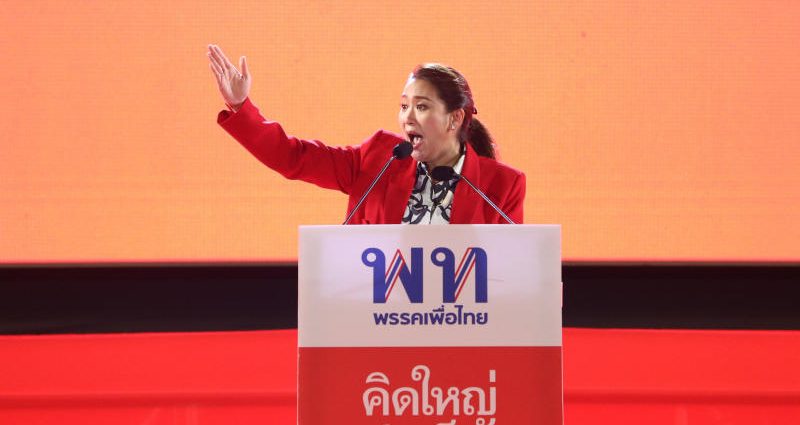“We’re fighting for that 99%, going against the 1% that is the elite, the military, the money.”

The Move Forward Party, which is surging in opinion polls ahead of the May 14 election, wants to reclaim the “lost decade” under a military-backed rule with proposals for sweeping reforms to revitalise Southeast Asia’s second-largest economy.
The Move Forward Party, which is surging in opinion polls ahead of the May 14 election, wants to reclaim the “lost decade” under a military-backed rule with proposals for sweeping reforms to revitalise Southeast Asia’s second-largest economy.
Its leader Pita Limjaroenrat, a 42-year-old alumnus of Harvard Kennedy School of Government, is pitching to spread economic activity beyond the capital city Bangkok, dismantle business monopolies and reduce the influence of the armed forces in politics.
“What we needed to do are three things in terms of policies: it’s to de-militarise, de-monopolise and decentralise,” Mr Pita said in a Bloomberg TV interview. “And that’s very much my 100-day agenda.”
Stakes are high as the general election is shaping up to be a contest between the pro-establishment parties of the ruling military-backed coalition that has helmed the country since a coup in 2014 and the pro-democracy opposition, including Move Forward and Pheu Thai parties. Reviving a once-vibrant economy that grew at the slowest pace in the region last year after the Covid-19 pandemic dealt a blow to its tourism and manufacturing is also in focus.
“The stake is the 1% versus the 99%. If the incumbent wins, that 1% will keep prospering and inequality will grow. If the 99% wins, that means Thailand will change for good,” said Mr Pita, who was nominated earlier this month as the party’s candidate for prime minister. “People label us as extremists, far-left, and all that. But we’re fighting for that 99%, going against the 1% that is the elite, the military, the money.”
– Outdated laws –
The Move Forward leader said his party will get rid of outdated laws that deter businesses as well as usher in progressive measures to “finally democratise” Thailand after years of being under military rule that he refers to as a “lost decade.” Part of his 100-day agenda is starting a process to overhaul the charter written after Prime Minister Prayut Chan-o-cha, who served as commander-in-chief of the Royal Thai Army from 2010 to 2014, staged a coup in May 2014 that toppled the Pheu Thai Party.

Caretaker Prime Minister Prayut Chan-o-cha speaks to a gathering of supporters at his first election campaign address as member of the United Thai Nation (UTN) Party in Chumphon province on Jan 28, 2023. (Screenshot)
Mr Pita said ending the monopoly of a few liquor companies and passing a marriage equality bill are examples of how Move Forward proposes to bring reforms. The party will also seek to end mandatory military conscription and cut the size of the army to free up defense budget and also stop the cycle of coups.
Set up in 2020 after its predecessor Future Forward was disbanded and the founders banned from politics, Move Forward has inherited much of the progressive ideology and the push to change the post-coup constitution.
Mr Pita is confident his party can win more than more than 100 seats in the 500-member House of Representatives, up from about 80 it won in 2019. He is seeking to wrest the premiership from Gen Prayut in a crowded race led by Pheu Thai’s Paetongtarn Shinawatra, youngest daughter of ousted prime minister Thaksin Shinawatra whose government was toppled in a 2006 coup.
The party may win about 21% of votes, a survey by the National Institute of Development Administration (Nida) showed this month, a four-point jump from a month earlier. While recent Nida surveys showed Mr Pita gain popularity over the last few months, another survey by Thai language newspapers Matichon and Daily News this week ranked him above Ms Paetongtarn.

Paetongtarn “Ung Ing” Shinawatra, a Pheu Thai Party prime ministerial candidate. (Photo: Pattarapong Chatpattarasill)
An improved showing in the election alone will not propel Move Forward into power as rules are stacked against pro-democracy parties with a military appointed 250-member Senate holding the key to government formation. Mr Pita’s party will need to join hands with Pheu Thai that’s projected to win the most seats.
Mr Pita said if Pheu Thai and Move Forward win 300 seats together in the House of Representatives, it can form the government with one of their prime ministerial candidates in the top office.
But as Move Forward’s mostly young parliamentarians made a mark in the past four years by exposing corruption and challenging the status quo that benefits big businesses and powerful elite, the threat of another dissolution always looms. Mr Pita warned any potential move to disband the party will come with a heavy price tag — like another youth protest that he likened to a “wild fire.”
“We’ve learned our lessons and are prepared legally,” Mr Pita said. “People are fed up, especially the younger generations. We cannot tolerate this kind of thing anymore.”

